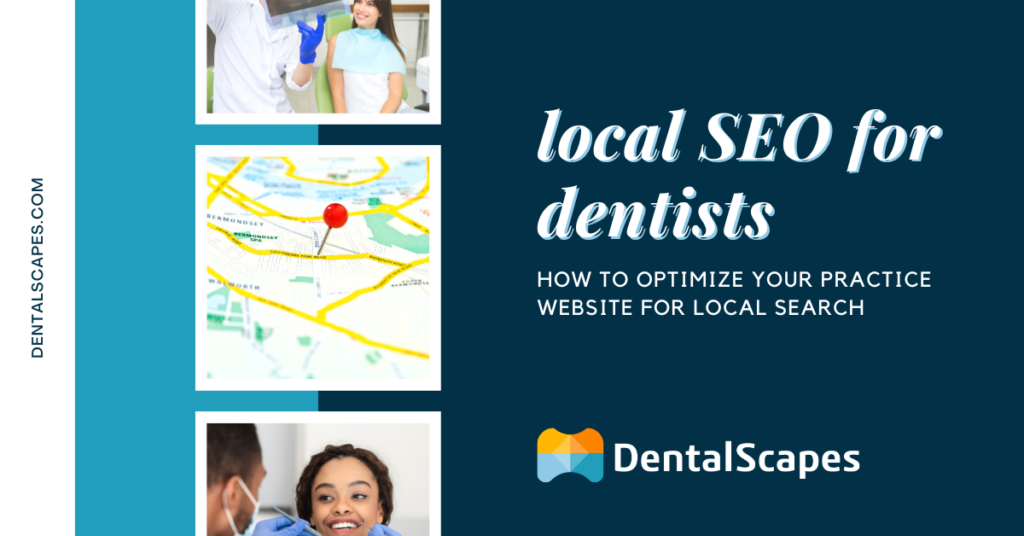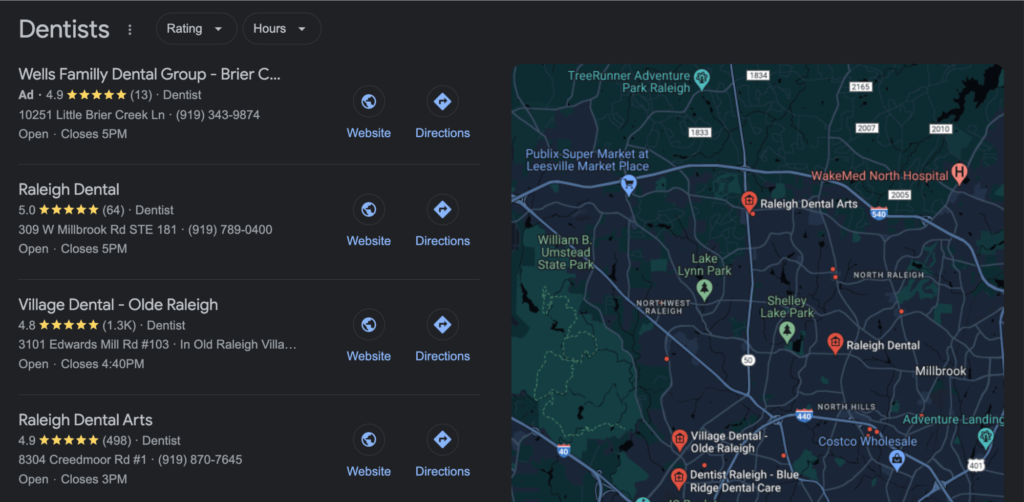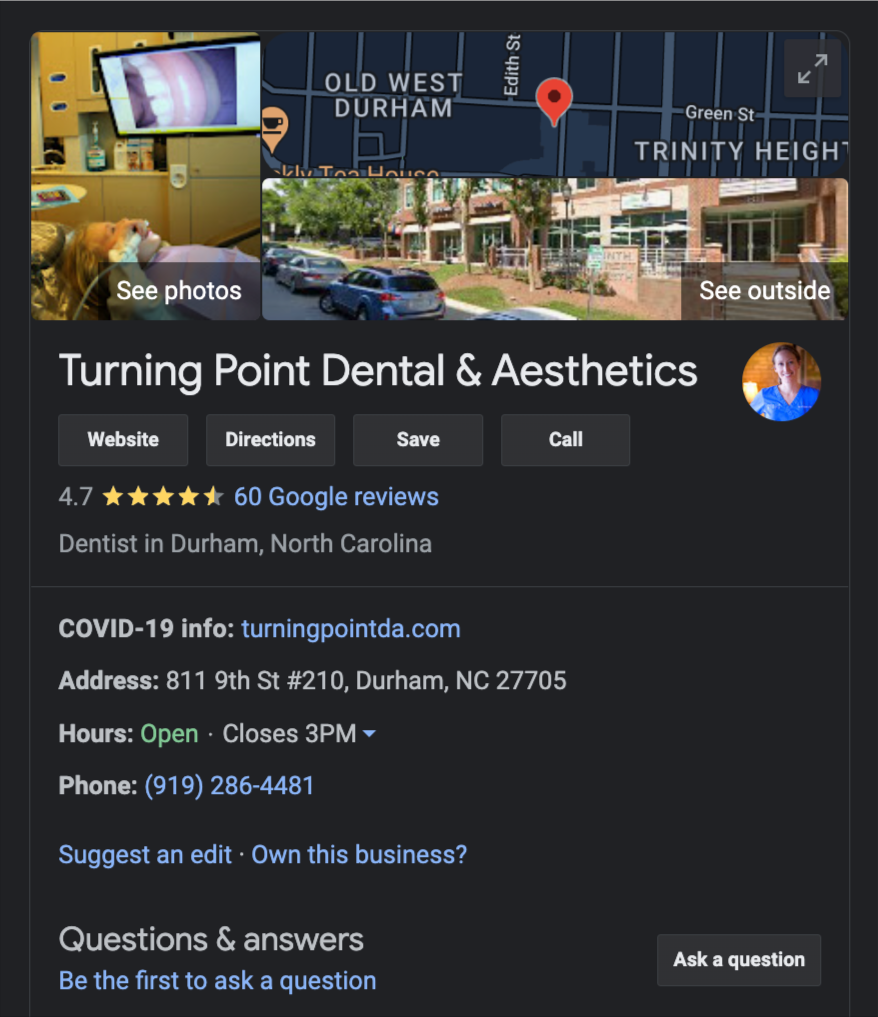SEO is critical for dental and orthodontic practices, but there’s nothing more important than local SEO. From the local “Map Pack” to Google Business Profiles, citations and reviews, and everything in between, local SEO for dentists is a must-have for practices that want to generate more leads, grow patient volume, and increase profitability. In this blog post, we’ll dig into how to optimize your dental website for local search.

What is “Local” SEO?
Search engine optimization (SEO) is the process of improving your website to increase rankings (and therefore traffic) on the search engine results page (SERP), primarily Google. Local SEO, on the other hand, is exactly what it sounds like — the process of improving your website and online presence to increase rankings and search visibility in your local market.
Beyond just having a website, maybe nothing is as important in digital marketing for dentists and orthodontists than local SEO.
Elements of Local SEO for Dentists and Orthodontists
Local SEO is far more than simply the ranked results that appear when someone, for example, searches for “Raleigh dentist” or “Chicago orthodontist.” That’s obviously important (you always want to rank as high as possible — practically no one scans beyond page 1 of the search results), but local SEO also includes many other components.
Key components of local SEO include:
- Organic rankings — basic, numbered search results that appear immediately after paid ads
- Google Business Profiles — formerly known as Google My Business, or GMB, these profiles correspond to local businesses, such as dental and orthodontic practices. They include details about the business, including contact information, website, photos, posts, reviews and more
- Local “Map Pack” — a box appearing near the top of the SERP that contains 3 (or sometimes more) businesses relevant to the user’s search query (the Map Pack appears in 93% of searches with local intent, according to one recent estimate)
- Citations — in local SEO, “citations” are mentions of your business’s name, address, and contact information on other websites
- Inbound links — in the context of local SEO, inbound links include links from external websites to your practice’s website that contain local context (e.g., link “anchor” text that includes a geographic identifier like city or state)
Of course, there are other, more technical elements that can also impact a dental practice’s local SEO, but we’ll stick to the basics here.

How to Improve Local SEO for Your Dental Practice
The holy grail of local SEO for dentists and orthodontists is getting your practice: 1) ranked highly in the organic search results (you’re typically aiming for positions 1-3 for maximum visibility); and 2) included in the local Map Pack.
So how do you do that?
The best way to improve your dental practice’s local SEO is to focus on optimizing the other three components listed above — your Google Business Profile(s), citations, and inbound links.
Doing that is easier said than done, but here’s a quick breakdown:
How to Optimize Your Dental Practice’s Google Business Profile (formerly Google My Business)
The Google Business Profile contains all kinds of information about your dental practice, and appears smack dab on page 1 of the SERP when a potential patient performs a “branded” search that includes your practice’s name.
Your Google Business Profile is the “hub” that communicates to Google (and searchers) what your business is all about. A Google Business Profile includes many elements, including but not limited to:
- Business name
- Address
- Phone number (often including a click-to-call button)
- Business hours
- Map (linked to Google Maps) and directions
- Website link
- Photos
- Reviews, including your aggregate rating and several featured reviews
- A “Q&A” section
- Social media links
- “Posts” (social media-type updates from your business)
It’s a lot. Your Google Business Profile is packed with opportunities to optimize your local search presence. By keeping your profile up-to-date and taking advantage of all of its features, you can make your dental practice stand out — and make sure that Google has the latest information to include in its other search products.
From changing business hours for holidays to adding photos, answering FAQs and posting updates, the key to optimizing your Google Business Profile is to do it often and make sure everything is accurate.

How to Build Citations for Local SEO for Your Dental Practice
Citations, sometimes called “directory listings,” are mentions of your practice name, address, phone number and website on external websites. Because Google’s algorithm uses citations to understand your practice’s prominence and relevance in your local market, it is critical that you obtain authoritative citations from reputable sites — and lots of them.
Sometimes a citation is free, and sometimes the directory site may charge a fee. Both types can be important, and paying for a citation can be worthwhile, especially if the site has a high domain authority / domain rating (stay tuned for another blog post on that in the near future).
Some examples of online directories where you can get high-value citations for your dental or orthodontic practice include:
- Yelp
- Your local Chamber of Commerce’s website
- Your local Better Business Bureau’s (BBB) website
- Mapquest
- familydentaldirectory.com
- dentists.com
- yellowpages.com (not the old-school book)
- vitals.com
- wellness.com
- whitepages.com
- Manta.com
There are hundreds of directory sites where you can get citations for your dental practice. Getting high-value citations from authoritative sites can make a huge impact in local SEO, including ranking highly in the organic search results and getting positioned in the Map Pack.
How to Get Inbound Links to Optimize Your Dental Office’s Local SEO
Inbound links from authoritative sites (not spammy or irrelevant ones) — especially those that contain local context — are also critical for local SEO for dentists and orthodontists.
Basically, Google views links from other websites to your dental practice’s website as “votes.” They signal that others find your site credible and authoritative. In local SEO, it’s especially valuable to get inbound links with “anchor text” that includes an indication of locality. Examples might include “Dallas dentist office” or “dentist in Richmond.”
Link-building is a time-intensive effort and one that typically requires some financial investment. Many high-authority websites charge a fee for a link, which may or may not be worth it based on that domain’s authority. In addition to paying for links, however, there are many ways to acquire high-value inbound links to improve your firm’s local SEO (and SEO in general), including:
- “Link exchanges” in which you and another business each place a link on your respective site
- Guest blogging, in which you write an original post for another website’s blog, including a link to your website
- Online press releases, which can be picked up by local and national media sites and sometimes include a link to your website
- Resource outreach, where you offer a helpful, relevant resource to another website in exchange for a link
Ultimately, however, maybe the best, most cost-effective way to build high-value inbound links to your dental practice’s website is to consistently publish high-quality, SEO-optimized content that others want to link to.
When you demonstrate thought leadership and provide value in your field, others searching for related terms will find it and, sometimes, link to your site from theirs.
Take Your Practice’s Local SEO to the Next Level
Whew. Local SEO is no joke, and it’s not for the faint of heart. It requires a great deal of time, patience, and in some cases, financial investment. But local SEO for dentists and orthodontists alike can truly transform a practice, driving more traffic, more phone calls, and more new patient appointments.
Sound good?
“So How Do I Get Started?”
Everything we’ve outlined above can be done by practice owners or support staff. But we’ll be honest — it’s a lot of work, and doing it right takes some technical know-how. That’s why we recommend that dentists and orthodontists consult with an experienced dental marketing agency.
At DentalScapes, we specialize in helping small and mid-size dental and orthodontic practices optimize their local SEO to maximize their local search presence and grow patient volume. If you’re interested in amping up your dental practice SEO game, book a free strategy call today and let’s talk.
